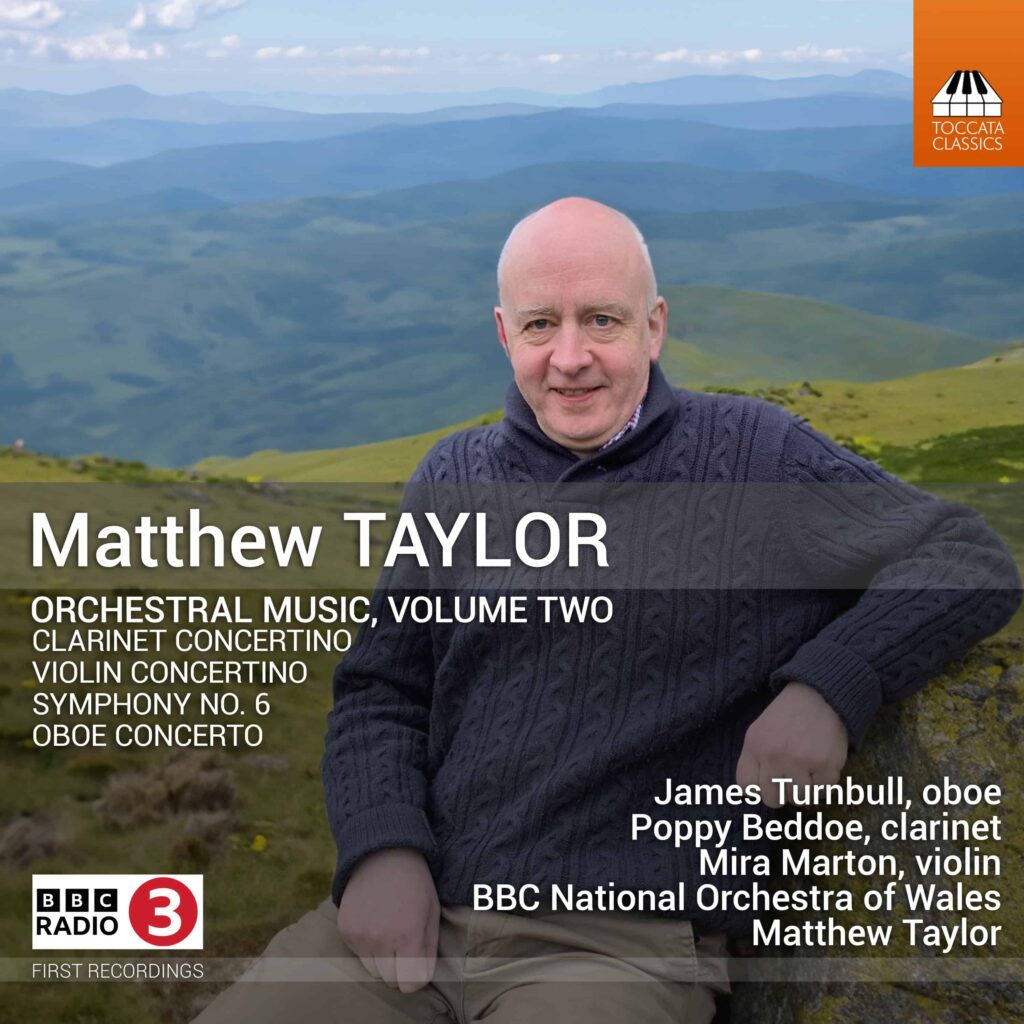https://arcana.fm/2024/06/24/matthew-taylor-2/
James Turnbull (oboe), Poppy Beddoe (clarinet), Mira Marton (violin), BBC National Orchestra of Wales / Matthew Taylor
Matthew Taylor
Symphony no.6 Op.62 (2021)
Oboe Concerto Op.60 (2020-21)
Clarinet Concertino Op.63 (2021)
Violin Concertino Op.52 (2016)
Toccata Classics TOCC0708 [69’32’’]
Producer Andrew Keener Engineer Andrew Smillie
Recorded 17 & 18 December 2022 in Hoddinott Hall, Millennium Centre, Cardiff
Reviewed by Richard Whitehouse
What’s the story?
Toccata Classics continues its now extensive coverage of Matthew Taylor (b.1964) with this coupling of his most recent symphony alongside three of his concertante pieces, two of them here played by the soloists for whom they were written and all with the composer conducting.
What’s the music like?
Those familiar with Taylor’s symphonic output will recall that the Fifth ended with an adagio of powerfully inward emotion, and the Sixth Symphony picks up on this directly. Dedicated to the memory of Malcolm Arnold in the year of his centenary, it is his contemporary Robert Simpson (a pervasive influence on Taylor’s formative years) who comes most to mind in an opening movement whose alternation between relative darkness and lightness is informed by a gradually cumulative momentum the more striking given this music’s textural transparency.
The second of three continuous movements centres on a fugal theme of affecting poise, one whose transformation is made more so by orchestration where piano and harp confirm their substantive rather than merely colouristic roles. Only with the finale does Arnold’s presence assert itself – the jazzy cast of its clarinet theme facilitating allusions to, if not quotations of, several of this composer’s salient works prior to a culmination that, launched by a crescendo of mounting anticipation, rounds off the whole work with a decidedly no-nonsense terseness.
Of the other pieces, the Oboe Concerto is most substantial. Imaginatively scored for Haydn-esque forces, with cors anglais instead of oboes, it inverts the expected order of movements with the first of these featuring a central section whose intermezzo-like deftness offsets the sombreness either side. There follows a Scherzo which further develops the primary motifs with dextrous virtuosity, before an Adagio affords not just closure but a sense of fulfilment through the emotional raptness such as pervades this most eloquent among Taylor’s finales.
Taylor having earlier written concertos for clarinet and violin, the present works are lighter in their overall mood but not slighter in actual content. Thus, the Violin Concertinointersperses respectively trenchant and lively outer sections with an ‘aria’ of wistful elegance, whereas the Clarinet Concertino frames its pert amalgam of slow movement and scherzo with an Andante of autumnal repose then a finale of artless naivety. Brahms is mentioned in the latter instance, though the late woodwind sonatas of Saint-Saëns and Poulenc might be felt equally apposite.
Does it all work?
It does, and not only because of Taylor’s sill in writing from a soloistic or orchestral vantage. Each of the concertante pieces confirms his feeling for the instrument in question, while the symphony reaffirms his status among the leading exponents of this genre from the past half-century. The three soloists are audibly attuned to his music, and the BBC National Orchestra of Wales continues the favourable impression it made with his Fourth Symphony (recorded by Kenneth Woods on Nimbus NI6406) by similarly responding to the composer’s direction.
Is it recommended?
It is, and not least when the booklet features informative notes by Taylor himself. This release is dedicated to the memory of Tom Hammond (1974-2021), trombonist and conductor whose untimely death deprived the musical world of a gifted musician and exemplary human being.
Listen & Buy
You can listen to samples and explore purchase options on the Toccata Classics website Click on the names for more on artists James Turnbull, Poppy Beddoe and Mira Marton, the BBC National Orchestra of Wales and composer / conductor Matthew Taylor

